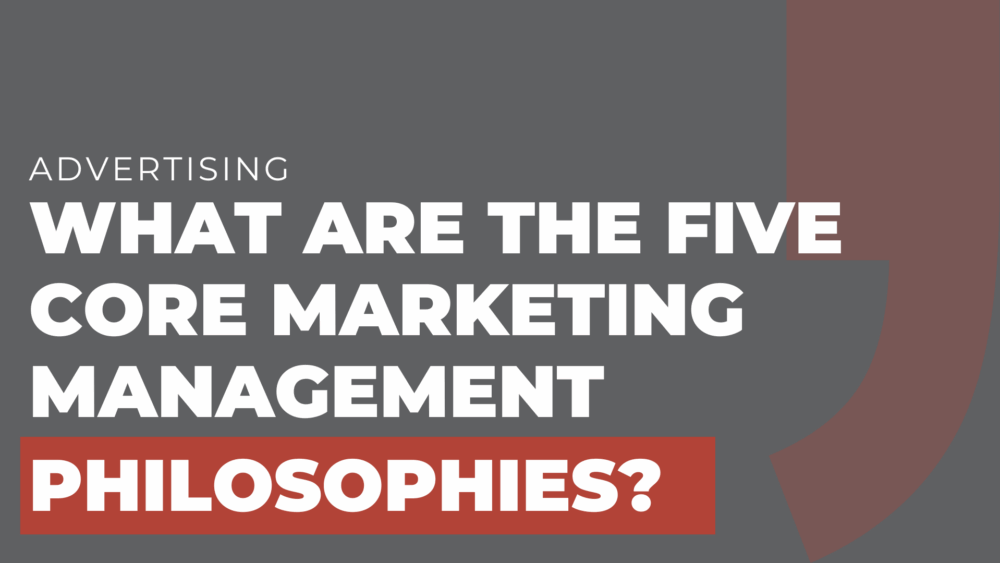Before we dive into campaign launches and brand makeovers, let’s zoom out.
Because every marketing decision—whether it’s your budget breakdown, your trade show booth, or your fourth round of logo tweaks—is rooted in one of five core marketing management philosophies. These philosophies shape how businesses think about marketing, sell products, and communicate with customers.
So, what are the five core marketing management philosophies?
They are: the Production Concept, Product Concept, Selling Concept, Marketing Concept, and Societal Marketing Concept. These aren’t just academic ideas—they’re frameworks that can make or break how your team operates and how your audience responds.
Let’s walk through each one like a marketer who’s got a full plate, a boss breathing down their neck, and deadlines to meet. (So, basically, like one of our clients.)
1. The Production Concept: “Make More, Spend Less”
The production concept assumes customers want products that are affordable and easy to find.
If your marketing strategy is anchored here, then you’re focused on efficiency. Think: mass production, cost-cutting, wide distribution. You’re cranking out deliverables, keeping costs low, and hoping volume does the heavy lifting.
But heads-up: if you’re only thinking about output, you’re probably not thinking about experience.
2. The Product Concept: “Build It Better, and They’ll Buy It”
Product-first thinking says customers are drawn to quality, performance, and innovation. Think of Apple—where sleek design and standout features drive customer loyalty, even without the lowest price.
This is the go-to philosophy for tech companies, high-end goods, and any brand that believes better features = better results. It’s a strong stance—until your audience forgets why your product matters. Because even the best product needs the right story and strategy behind it.
3. The Selling Concept: “Always Be Closing”
The selling concept is old-school. It pushes hard. It leans on tactics over trust. Classic infomercials or door-to-door sales teams fall into this camp—they prioritize volume over relationship.
This works in places where people aren’t actively shopping—like insurance, cold leads, or high-pressure B2B sales. You’ve probably heard it: “just get something out the door.”
That may hit short-term goals. But long-term? You’ll burn out your team and your brand.
4. The Marketing Concept: “What Do Our Customers Actually Want?”
This one’s the grown-up in the room. It flips the focus from product to people.
Here, marketing doesn’t start with what you want to sell. It starts with what your customer needs. Brands like Zappos win here—they focus deeply on customer service and long-term satisfaction. Their pain points. Their motivations. Their timeline.
If you’re working under this philosophy, you’re listening more than you’re pitching. You’re turning feedback into campaigns and research into results. That’s how modern marketing works—and honestly, it’s where MOCK lives.
5. The Societal Marketing Concept: “Good for Business, Better for the World”
The societal marketing concept adds one more voice to the mix: society.
Here, marketing isn’t just about value and experience. It’s about ethics. It’s about being transparent, doing good, and building long-term trust. Patagonia lives this out—putting sustainability at the heart of its marketing and product practices.
Brands that adopt this approach put their money where their mission is. It’s not just about selling more. It’s about doing better—for customers, communities, and the planet.
Why This Matters for Your Marketing Team
Most teams don’t really know which philosophy they’re using. And that’s a problem. When everyone’s working from a different playbook, things fall apart fast.
Each philosophy affects how your team works. The key roles and responsibilities of a marketing team will look different depending on whether you’re focused on selling, product quality, or customer needs.
If you’re leading the charge, the responsibilities of a managing director of marketing include making sure the team is working toward the same goal—and that the strategy actually fits the philosophy. It’s not just about getting stuff done. It’s about doing the right stuff, in the right way.
When your team and your approach match up, your marketing starts to click.
At The End Of The Day
The five core marketing management philosophies aren’t just for textbooks. They drive everything—budget, strategy, hiring, creative. Know them. Use them. Pick the one that fits your business best (or blend them with intention).
And if you’re unsure where you fall—or what direction to take—well, we can help with that too.
Need a Marketing Team That Actually Gets It?
If you’re tired of fluff, ghosted deadlines, or marketing that doesn’t connect—maybe it’s time for a different kind of partner.
At MOCK, we execute fast, design smart, and speak like humans (because we are). We’ll help you move with confidence—and look damn good doing it.
Let’s solve your next problem—on time and with style.
- Website: https://mocktheagency.com/
- Phone: 470-225-6814
- Email: hello@mocktheagency.com
- Address: 247 14th St NW, Atlanta, GA 30318


Comments are closed.